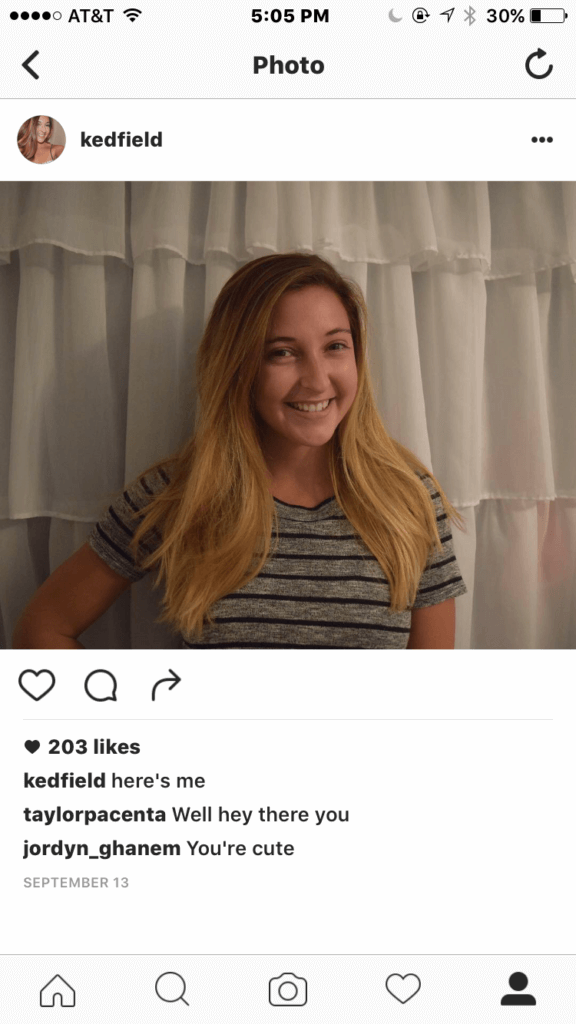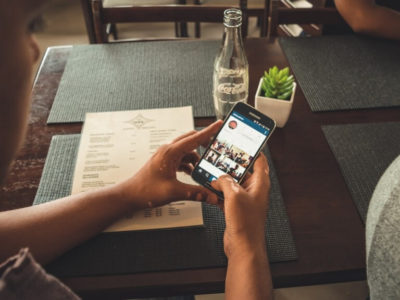“Post in the morning or late at night, you’ll get more likes.” “Don’t give your picture a black and white filter, you’ll get less likes.” “Yo, my LPM is phenomenal.” Like, what.
Although I’m guilty of these god-awful words spewing out my mouth, I wanted to get down to the nitty-gritty of social media and the multiple taboos associated, specifically, with Instagram. Working for College Magazine, I’ve essentially been given a platform to express all of my ideas, opinions and witty phrases—all with good taste, of course. With that in mind, I decided to create my own experiment.
Basically, I wanted to post two pictures on my personal Instagram account—one an extremely natural, completely unedited picture of myself, and the other the exact opposite (me lookin’ good). I was curious as to what the results would be. According to society, the edited, pretty picture of myself should receive a better, more approved reaction. Or would I, miraculously, receive more likes on my natural picture?
Tuesday, September 13, I posted a picture of myself with no makeup, no hair product and no editing. I posted the picture at 7:00 p.m. (on the dot). Side note: I recently helped my parents purchase a Nikon D3300 for myself, so I inevitably used this expensive-ass tool to snap these pictures.

Over the course of 24 hours, I received 203 likes along with two comments—which I found shocking due to the darkness of the picture, and the overall unedited look. I thought society hated these kind of pictures?
Within the 24 hours, however, I received interesting text messages. One of my best friends texted me literally one minute after I posted the picture asking me the meaning behind the post. To keep the validity of my experiment, I quickly changed the subject.

Shortly after, another friend of mine sent a screenshot in a group text (with me included) with three question marks and a laughing emoji. I resisted a reply.

Tuesday, September 20, I posted a picture of myself lookin’ hella good. My hair was way more tamed, and S/O to foundation and mascara for making me look more alive than in the previous picture. I brightened the picture up, slapped on a VSCO filter and at 7:00 p.m. (on the dot), I posted.

Unlike the former picture, I received no text messages regarding the reason for my post. But similarly to the former picture, I received the same amount of likes. To my dismay, and maybe to yours, I was very surprised. Although more of my loyal followers commented on the #prettier picture of myself, I got the same amount of likes on both. After I posted both, I began to mention to a few friends about my little experiment. Majority of them replied with, “Ohhhh okay. I knew there was some kind of meaning behind it.” I giggled to myself and said, “Well, that’s kind of the point I’m making…I think.” Everyone assumed there was a meaning behind both pictures, especially the unedited one. Why did there need to be a meaning? Because I performed an Instagram taboo, that’s why.
However, my taboo didn’t get the results I expected. Isn’t this against everything today’s society believes in and more? I was under the impression that today’s people vie for the edited version of someone or something.
Honestly, I expected many more likes on the edited picture; not so much because I’m confident in my looks, but textbook Instagram says so. “The idea that we present edited versions of ourselves online is not new. Social media sites, like Instagram and others that rely so heavily on images, have gotten a lot of attention as sites where people present their ‘perfect’ lives,” explained University of Iowa Professor Melissa Tully, who teaches Social Media Today. “Of course, we do choose to edit what we share and use filters and other techniques to present more attractive images, but this is not the only way people use these services. We also see people share pictures of struggle or images that depict hardship so I don’t think it’s all about sharing the most beautiful, edited version of ourselves at all times.”
Many underlying factors could affect any aspect of this experiment. People might be busier on Tuesday nights than I imagined, keeping them away from Instagram. Even a trendy picture of my room got more likes…so maybe my followers were tired of my face. Possibly my captions kept people from liking one or the other. “I think your reaction will depend a lot on how you caption the images,” said Tully. “If you post them both with no captions, you will get a different response than if you point out that you’re not wearing makeup or not using filters.”
Analyzing the results of my mini-experiment, I realize that maybe society doesn’t care as much about a flawless picture as we thought. Maybe my followers just double click, and move on—not focusing on the actual content.
Some might call me brave for posting such a vulnerable picture of myself, but why? Why would that action be categorized as brave? Sometimes, people need to step back from the perfect, edited world and enjoy the flawed, scarred reality of each day—we might miss something extraordinarily beautiful.



















